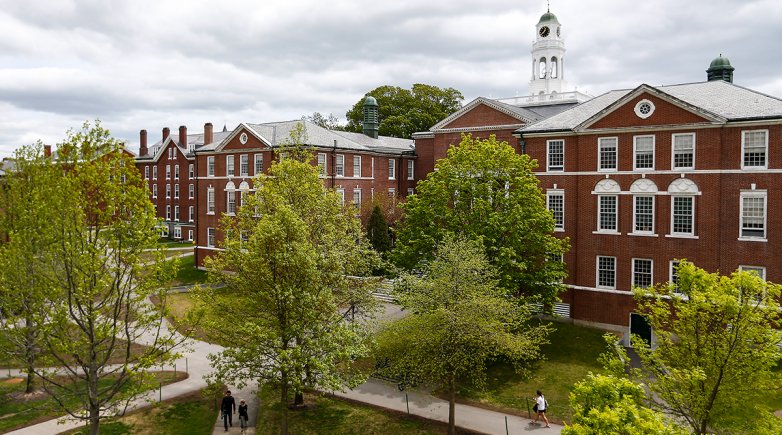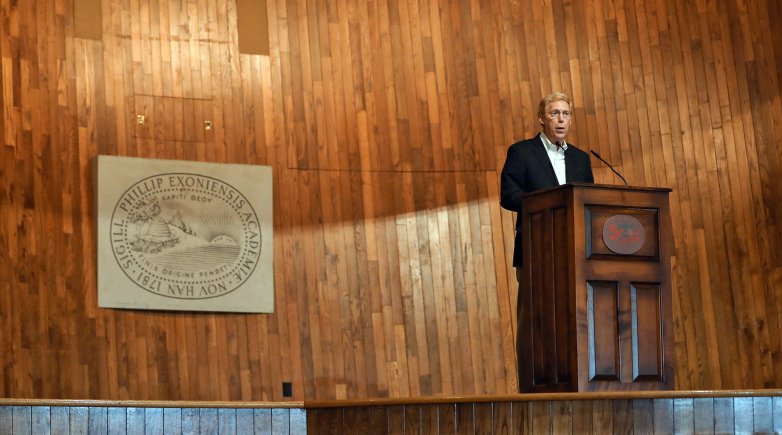Letter to the Exeter Community

Announcement of initiatives to institutionalize the practice of anti-racism at Exeter.
We write to you today to announce a number of preliminary initiatives that we are undertaking to act on the commitments that we made to you in our letter dated June 5, and to move us forward in our determination to be more intentional and proactive in our efforts to oppose racism in all of its forms in order to become an anti-racist school.
Like many of you, we are looking into our own hearts, as well we all should, and coming to a long overdue realization that our well-intended efforts to free ourselves from the grip of systemic racism have not been enough. Until we actually meet our sincere goals of true understanding, acknowledgment and counteraction of the very privileges that have allowed only some of us to thrive, we will only reinforce the legacy of racism in our institutions and in our country, and we will continue to let racism win.
Racism is formidable. It is as persistent as it is poisonous. It thrives on divisiveness and wants us to believe that it is too deeply entrenched and too pervasive to be reckoned with. Now, more than ever, we need action and must see change.
We have historically prided ourselves on Exeter’s considerable efforts to achieve true diversity, equity and inclusion in our students and our faculty and staff, reimagine and expand our founding credo of educating youth from every quarter, and prepare our students to be leaders and champions of non sibi. But we are not yet where we want to be, and there is still much work to be done to ensure that the Exeter of the future is one that all of us can take great pride in.
Let us be clear: Black lives matter, and Black voices matter, and we are committed to institutionalize the practice of anti-racism at Exeter in support of these key principles. This process of self-examination and action will take time and will require further steps that we are now beginning to formulate, but we are starting by taking the following actions:
- We commit to make it an institutional priority to increase the number of faculty of color by at least 50% over the next five years.
- We will appoint a new Assistant Dean of Faculty whose responsibilities will include oversight of this hiring and retention initiative, with the budget to support the necessary efforts that will lead to stronger and more diverse candidate pools.
- We will appoint a new Assistant Director of Diversity, Equity and Inclusion to focus on engagement with the local community, support faculty retention strategies, and provide additional support for students.
- We will increase the representation of faculty and staff of color in leadership positions in administration, committee structures, residential life and in other aspects of our community and campus culture.
- In addition to the recently announced creation of the Trustee Task Force on Diversity, Equity and Inclusion, we will create a Diversity, Equity and Inclusion Response Team on campus to address issues of race in national events, our campus culture and our alumni/ae community.
- We will develop and declare reporting, accountability and educational protocols for incidents where adults and students feel they have been harmed based on race, ethnicity, gender, sexual orientation, religion or other personal identity characteristics.
- We will continue the work started this past winter to examine Exeter’s historical ties to slavery and any other legacy of oppression in our school history, and to develop programming that will acknowledge and educate our community about that history.
- We will create a new cross-department faculty working group to focus on incorporating themes of race, equity and justice into the curriculum of each department.
- We will improve and expand the Office of Multicultural Affairs office and meeting space to facilitate more robust affinity programming for students.
- We will reimagine/redesign how we use the Assembly Hall and other campus gathering places to reflect and celebrate our diverse and inclusive community, while recognizing past generations of Exonians and the important service of past leaders of our community.
- We will fund and implement a data collection and analytics project that will gather feedback from current and past community members to give us greater visibility into the areas where we need improvement, particularly with respect to our ability to hire and retain diverse teaching faculty, as well as enabling us to systematize our best practices. We will share the findings of our assessment with the broader Exeter community so it can inform our future conversations and actions.
- Many students and student organizations have asked the trustees to use the Academy’s endowment to support a number of nonprofit organizations involved in the fight for Black racial justice. The trustees believe our mission – and our obligation – compels us to direct the human, financial and physical resources of the Academy to the education and well-being of our community members. We are establishing a new Principal’s discretionary fund to support the Academy’s anti-racism and Diversity, Equity and Inclusion initiatives. All trustees have committed to support this fund and we hope others in our community will join us in doing so.
We all have a role in doing this work, and must continue to hold ourselves and each other accountable for progress on these and other initiatives. At least one faculty meeting and one department meeting will be dedicated to anti-racist work every month during the coming academic year. The newly formed Trustee Task Force on Diversity, Equity and Inclusion has already begun to work with the Principal and our Director of Diversity, Equity and Inclusion to identify these and further specific action items designed to improve the work and life of adults and students of color at Exeter. The Task Force will coordinate with the various trustee committees to ensure that all aspects of trustee work are infused with a focus on addressing issues of Diversity, Equity and Inclusion.
Two years ago, the trustees published a vision statement that declared our commitment to the principles of Diversity, Equity and Inclusion. The recent tragic events in our country have moved us to reaffirm that commitment with a new sense of urgency and purpose. We will not allow the enormity of this challenge to shake our determination. We will stand and work together to combat the evils of racism with the goodness of empathy and the power of knowledge.
We encourage everyone in the community to come forward to provide us with your best thinking about how we, as a community, can address these important issues of race at Exeter. We have set up a DEI@exeter.edu email account to receive your suggestions. We must have the strength of our convictions to act courageously and move our community forward. It is only if we work together in this way that we can become the school that we aspire to be. We want to ensure that everyone feels a sense of belonging and is allowed to thrive.
We welcome everyone’s voice in this journey. Our current and future students deserve a better world, and we owe it to them to model, and prepare them to work for, the future we want them to have.
Sincerely,
William K. Rawson ’71; P’08
Principal
John A. Downer ’75; P’06, ’06, ’07
Outgoing President of the Trustees
Morgan C.W. Sze ’83; P’19, ’22
President-Elect of the Trustees
Wole Coaxum ’88; P’23
Trustee, Outgoing Vice President of the Trustees
Deidre G. O’Byrne ’84; P’18, ’20, ’23
Vice President-Elect of the Trustees
Jacqueline J. Hayes ’85
Chair, Trustee Task Force on Diversity, Equity and Inclusion
Ciatta Z. Baysah ’97
Trustee, Outgoing President, GAA
Suzi Kwon Cohen ’88
Trustee
Walter C. Donovan ’81
Trustee
Mark A. Edwards ’78; P’12, ’14
Trustee
Claudine Gay ’88
Trustee
Peter Georgescu ’57
Trustee
Jennifer P. Holleran ’86; P’11
Trustee
Cia Buckley Marakovits ’83
Trustee
Sally Jutabha Michaels ’82; P’12, ’14, ’17, ’19
Trustee
Daniel C. Oakley ’80
Trustee, Outgoing Vice President, GAA
Peter M. Scocimara ’82; P’16, ’18
Trustee
Serena Wille Sides ’89
Trustee
Kristyn A. McLeod Van Ostern ’96
Trustee
E. Janney Wilson ’83
Trustee, President-Elect, GAA

